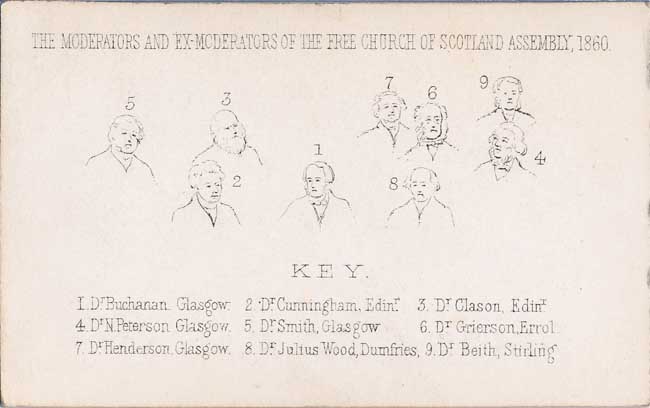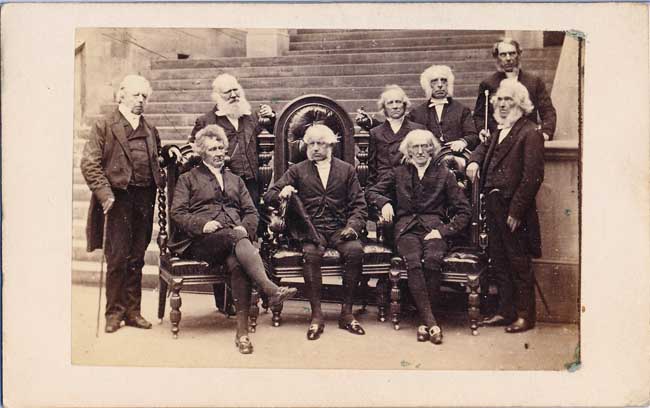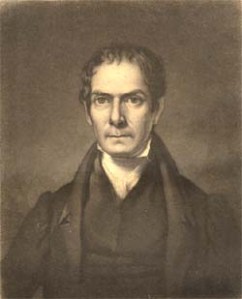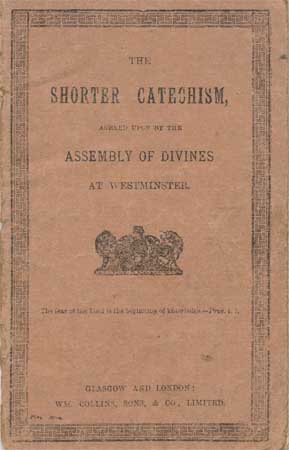Over on the Puritan Board discussion group, ARP pastor Ben Glaser (Ellisville, MS) put forward a great question:—
“When did Presbyteries, Synods, and General Assemblies begin regularly having the Lord’s Supper at their meetings?”
With a bit of digging, I found that in the Southern Presbyterian Church, it wasn’t until 1912, at the 52d General Assembly of the Presbyterian Church, U.S., that we find this:
The Standing Committee on Devotional Exercises presented the following resolution, which was adopted:
We recommend that it be a standing rule in our Assembly that immediately following the Moderator’s opening sermon, the sacrament of the Lord’s supper shall be celebrated, the retiring Moderator presiding.
— W.O. Cochrane, Chairman.
Switching over to the Presbyterian Church in the U.S.A. (aka, Northern Presbyterian Church), we have to go all the way back to 1871 to find this report spread on their Minutes, at pp. 577-578:
6. The Lord’s Supper.—In regard to the celebration of the Lord’s Supper, in connection with the stated meetings of the judicatories of the Church, your Committee feel hardly prepared to recommend any absolute and universal change. And yet it cannot be denied, that grave objections exist as to the manner in which this sacred service is often observed. Too much, as a matter of form, crowded in between hours of pressing business, if not of exciting discussion, with little or no preparatory exercises, it is not strange that this, which should be the richest feast of blessing, the very climax of privilege, has so often proved dull and formal, and of little spiritual advantage. As originally instituted by our Lord, this sacrament was a “supper,” observed at an appointed “hour,” “when the even was come” of “the same night in which he was betrayed.” Might not many impressive associations be secured if, in the imitation of his example, it were, whenever possible, appointed for [I]an evening service[/I], exclusively distinct from all the business of the day?
“With desire,” he said, “have I desired to eat this passover with you before I suffer.” Ought not his ministering servants, in their stated assemblies, to guard against any influences which may tend to cool the ardor of their “desire” for the recurrence of the Sacred Feast?
“Let a man examine himself,” said the apostle, “and so let him eat that bread and drink that cup.” Ought not careful arrangements to be made for “attending thereto with diligence, preparation, and prayer”? And, unless due opportunity be given for such preparation, would it not be better, at our ecclesiastical meetings, not to appoint the formal service at all?
Your Committee recommend, that the attention of Judicatories be called to this important subject, and that, independent of past customs, they be enjoined to take such action with reference to it, as may seem most in harmony with the Divine arrangement, and best calculated to promote the spiritual welfare of themselves and the congregations with which from time to time they may meet.
Resolved, That the Committee of Arrangements for the next General Assembly be instructed, to provide for the celebration of the Lord’s Supper, on the evening of the first day of its sessions.
Looking back in the older Minutes of General Assembly for the Presbyterian Church, U.S.A. (Old School), those prior to 1869, we find that meetings are opened and closed with prayer, as we would expect. And there is mention of devotional exercises, but there is no mention of any observance of the Lord’s Supper, so far as I could find.
Two possibilities occur then:
1. Either the observance of the Lord’s Supper at General Assembly (and presumably at Presbytery and/or Synod as well) was a practice that has its beginning among the New School Presbyterians.
or,
2. When Assemblies met for eight days or more, as they used to, the included Lord’s Day was an obvious time of worship and likely also for celebration of the Supper. So perhaps as Assemblies began to meet for six or fewer days, the need began to be felt for more structured times of worship, with inclusion of the Supper.
Testing the first thesis, I found in the Minutes of the 1868 New School Assembly, on page 42, this note:
The Assembly met, and united with a large congregation of Christian believers in the celebration of the Lord’s Supper.
That Assembly had convened on Friday, May 22d, 1868, and met Saturday in continuation. Then there is no reference whatsoever in the Minutes as to what that Assembly did on Sunday. Business continued again on Monday through the week, and on Friday, celebration of the Supper at 3 PM. Business continued on Saturday, adjourned, no mention of Sunday, and business concluded on Monday, June 1st. There was only the one observance of the Lord’s Supper on Thursday, May 28th.
In the 1839 New School GA Minutes, on page 13:
On Saturday evening, a quarter before 8 o’clock, a Lecture preparatory to the sacrament was preached by the Rev. Dr. Williston; and on Sabbath, P.M., at 5 o’clock, the Lord’s supper was administered, in the First Presbyterian Church [Philadelphia], to the members of the Assembly, and to a large congregation of Christian Brethren, according to the previous arrangement.
Admittedly there, in 1839, celebration of the Supper took place on the Lord’s Day, but it was nonetheless administered to the Assembly. Also noted is the fact that the Supper was not observed at the opening of that Assembly, but rather was observed later while the Assembly was in session. Checking other New School Minutes, there does not appear to have been any celebration of the Supper in 1840, 1843, or 1855. But in 1849 and 1850, at each of those Assemblies, there was the observance of the Supper on Thursday, at 4 PM and 7:45 PM respectively.
So while they might have been spotty in their observance, there does seem to be a case for the idea that the celebration of the Lord’s Supper by the higher courts of the Church is a practice that comes out of New School Presbyterianism. It is only after the reunion of 1869-70 that the practice becomes regularized in the PCUSA.



![Plummer, William Swan [1826-1880]](https://continuing.files.wordpress.com/2013/08/plumerws.jpg?w=183&h=300)

![Rev. Dr. Archibald Alexander [1772-1851]](https://continuing.files.wordpress.com/2012/01/alexandera1.jpg?w=219&h=300)
